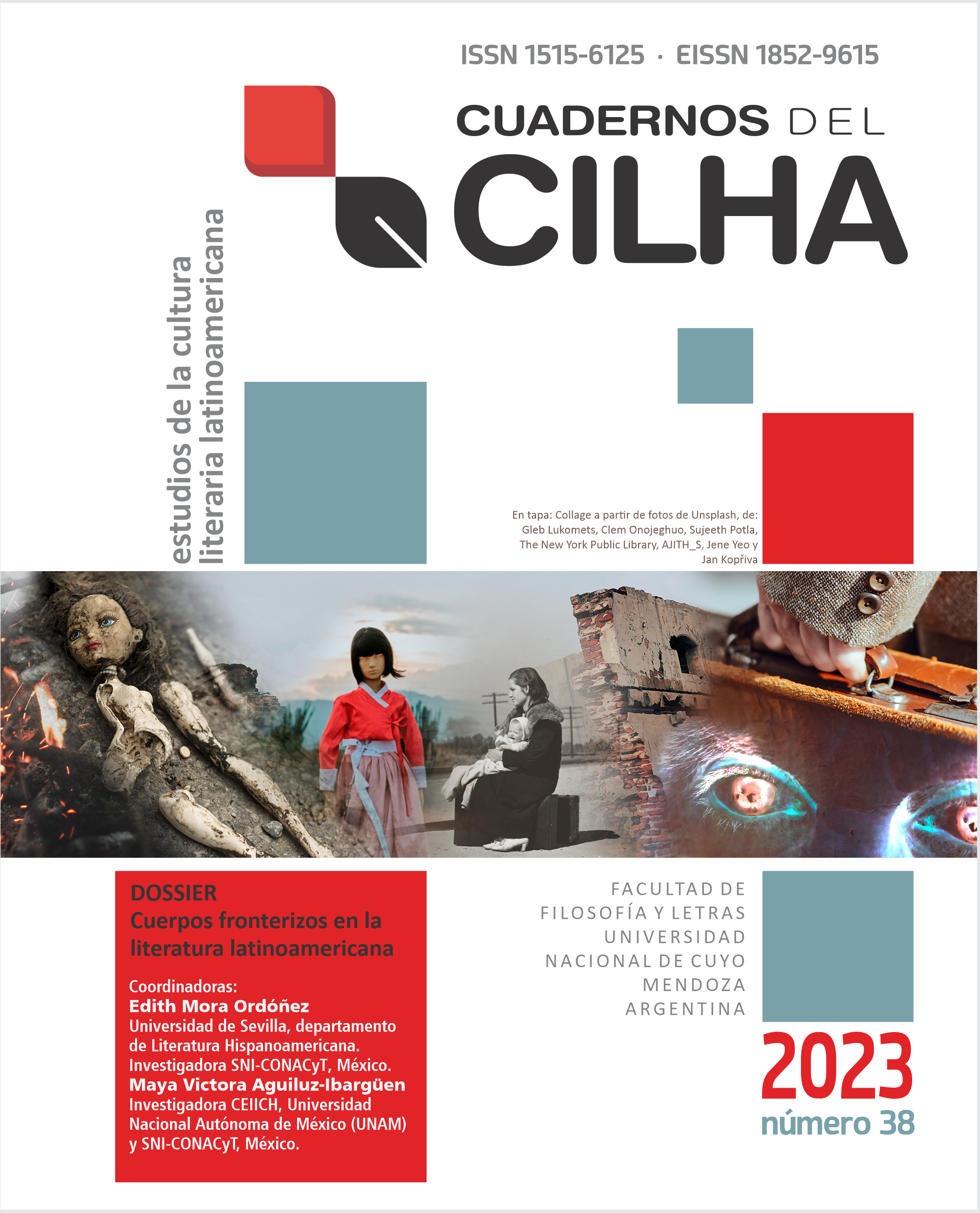The agonist rhetoric in “Las cosas que perdimos en el fuego” by Mariana Enriquez
DOI:
https://doi.org/10.48162/rev.34.059Keywords:
Woman, Latin American Literature, Community, Hegemony, DissentAbstract
Departing from Laclau and Mouffe, I propose that “Things we lost in the fire” of Enriquez opens a way for the political transformation of women, not linked to representation, but to rhetorical mechanisms that affect the interrelationship between the signifiers that organize the social space in hegemony. Through the analysis of the descriptive configurations of the story, first, I trace the dichotomization of the social space in the antagonism “they (men)-we (woman)” and the reproduction of the "woman-object" analogy in different characters. Later, I argue that there is metonymic iterability which is reintroduced in the metaphor-support of this identity because the fire is transformed from a control device into a counter-hegemonic practice. However, there are signs that it becomes hegemonic once the "monster" metaphor has become affectively overdetermined and consolidated into a mythical identity as an effect of repetition. Faced with this budding alternative hegemony, the story confronts an agonistic rhetoric that introduces aesthetic dissent and radical heterogeneity in the antagonistic discourse, problematizing the territorialization of singular affections in hegemonic social formations. This agonistic rhetoric suggests the possibility of a dissensus of women where the condition becomes a political power of reinvention.
References
Amaro, L. (2021). En estado de resistencia: la reciente narrativa hispanoamericana de mujeres, Catedral tomada, 9 (16), 30-61. https://doi.org/10.5195/ct/2021.518
Bustamante Escalona, F. (2019). Cuerpos que aparecen, “cuerpos-escrache”: de la posmemoria al trauma y el horror en relatos de Mariana Enriquez, Taller de Letras, 64, 31-35. https://doi.org/10.7764/tl6431-45
Corroto, P. (2017, 14 de agosto). El otro 'boom' latinoamericano es femenino. El país. https://elpais.com/cultura/2017/08/13/actualidad/1502641791_807871.html
Domínguez, N. (2018). Entre lo singular y lo colectivo. CELEHIS–Revista del Centro de Letras Hispanoamericanas, 27 (36), 35-45. https://fh.mdp.edu.ar/revistas/index.php/celehis/article/view/3105
De Mauro Rucovsky, M. A. (2019). "En sueños veo los crímenes”: Feminicidio, ficción y agenciamiento, Macabéa. Revista Eletrônica do Netlli, 8 (1), 76-102. https://doi.org/10.47295/mren.v8i1.1882
Enriquez, M. (2016). Las cosas que perdimos en el fuego. Anagrama.
Federici, S. (2010). Caliban y la bruja. Mujeres, cuerpo y acumulación originaria. Traficantes de sueños.
Gago, V. (2019). La potencia feminista. O el deseo de cambiarlo todo. Tinta Limón, Traficantes de sueños.
Gallegos Cuiñas, A. (2015). Comienzos de la novísima novela argentina (2001-2011), Hispámerica, 130, 3-14.
Gallegos Cuiñas, A. (2020). Feminismo y literatura (argentina) mundial: Selva Almada, Mariana Enríquez y Samanta Schweblin. En J. J. Gustavo Guerrero, B. L. Locane & G. Müller (Eds.), Latin American Literatures in the World/ Literaturas Latinoamericanas en el Mundo. Dispositivos y disidencias (pp. 71-96). De Gruyter. https://doi.org/10.1515/9783110673678
Hochbaum, Z. (2022, 20 de agosto). El nuevo "boom" literario, Infobae. https://www.infobae.com/opinion/2022/08/20/el-nuevo-boom-literario/
Jáuregui, G. (2018). Tsunami. Sexto piso.
Jáuregui, G. (2020). Tsunami 2. Sexto piso, UAM.
Laclau, E. (2014). Los fundamentos retóricos de la sociedad. FCE.
Laclau, E. (2005). La razón populista. FCE.
Laclau, E. y Mouffe, C. (1987). Hegemonía y estrategia socialista. Siglo XXI.
Lalkovičová, E. (2020). Las nuevas escritoras argentinas en el mapa literario: contexto y factores de su entrada en la literatura mundial". Colindancias: Revista de la Red de Hispanistas de Europa Central, 11, 151-169.
Leandro-Hernández, L. (2018). Escribir la realidad a través de la ficción: el papel del fantasma y la memorian en ‘Cuando hablábamos con los muertos’ de Mariana Enriquez, Brumal, VI (2), 145-164. https://doi.org/10.5565/rev/brumal.522
Loría Araujo, D. (2020). Fuerzas oscuras y narrativas porosas en la obra de Mariana Enriquez, Pirandante, 5, 54-67.
Mejía Hernández, D. O. (abril, 2022). El rol de la literatura feminista en la formación jurisdiccional: una lectura a Las cosas que perdimos en el fuego, de Mariana Enriquez, EX LEGIBUS, 16, 151-167.
Mouffe, C. (2013). Agonistics. Thinking the world politically. Verso.
Olmedo, N. (2022). Todos nuestros miedos: violencia de género y terror enLas cosas que perdimos en el fuego, de Mariana Enríquez, Tesis (Lima), 16, (20), 315-326. https://doi.org/10.15381/tesis.v15i20.23525
Pacheco, A. (2021, 20 de diciembre). Boom o Tsunami. Esa es la pregunta, Literal. Latin American Voices. https://literalmagazine.com/boom-o-tsunami-esa-es-la-pregunta/
Palermo, G. (2019, 20 de agosto). El nuevo boom latinoamericano está escrito por mujeres, El observador. https://www.elobservador.com.uy/nota/el-nuevo-boom-latinoamericano-esta-escrito-por-mujeres-2019819112917
Pimentel, L.A. (2001). El espacio en la ficción. Siglo XXI.
Ramella, J. (2019) El reencantamiento terrorífico del cuento argentino: Mariana Enríquez, Boletín GEC, 23, 122-138.
Rancière, J. (2009). El reparto de lo sensible. Estética y política. Arces-Lom.
Rodríguez de la Vega, V. (2018). Desafiando al patriarcado a través del fuego: el empoderamiento de las mujeres en Las cosas que perdimos en el fuego de Mariana Enriquez, Transmodernity: Journal of Peripheral Cultural Production of the Luso-Hispanic World, 8 (1) 144-161.
Romano Hurtado, B. (2022, 02 de noviembre). El imaginario escatológico de Mariana Enriquez como modo de resistencia de lo femenino en Las cosas que perdimos en el fuego, ILCEA, 48. http://journals.openedition.org/ilcea/15794
Sánchez, L. A. (2019). Resistencia y libertad: una lectura de ‘Las cosas que perdimos en el fuego’ de Mariana Enríquez, Acta Literaria, 59, 107-119. http://dx.doi.org/10.4067/S0717-68482019000200107
Semilla Durán, M.A. (2018). Fantasmas: el eterno retorno. Lo fantástico y lo político en algunos relatos de Mariana Enriquez, Revell 3 (20), 261-278.
Scherer, F. (2021, 12 de junio). El nuevo boom latinoamericano: las escritoras marcan el rumbo. La Nación. https://www.lanacion.com.ar/lifestyle/el-nuevo-boom-latinoamericano-las-escritoras-marcan-el-rumbo-nid12062021/
Downloads
Published
How to Cite
Issue
Section
License
Copyright (c) 2023 Selma Rodal Linares

This work is licensed under a Creative Commons Attribution-NonCommercial 4.0 International License.













































